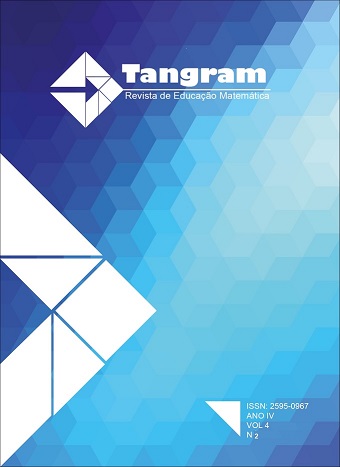Álgebra más allá de letras y números: Oportunidades para desarrollar el pensamiento algebraico en la Educación Primaria
DOI:
https://doi.org/10.30612/tangram.v4i4.15415Keywords:
pensamiento algebraico, álgebra escolar, Educación PrimariaAbstract
En este artículo presentamos ideas que podrían ayudar a profesores y profesoras a fomentar el pensamiento algebraico de sus estudiantes de Educación Primaria (6-12 años). Si bien diferentes países incluyen la idea de álgebra (y pensamiento algebraico) en sus normativas curriculares, todavía faltan elementos que ayuden a ver el álgebra más allá de letras y números. Los objetivos de este artículo son: (a) caracterizar elementos conceptuales y teóricos involucrados en el pensamiento algebraico, y (b) reflexionar qué decisiones pedagógicas podrían fomentar el pensamiento algebraico de estudiantes de Educación Primaria. Para abordar ambos objetivos, presentamos las respuestas de algunos estudiantes que participaron en diferentes sesiones de un taller de matemáticas, durante el verano de 2021. En concreto, presentamos tres problemas que trabajaron los estudiantes y exponemos algunas de sus respuestas (orales y escritas). A partir de dichas respuestas, resaltamos oportunidades para desarrollar el pensamiento algebraico en los diferentes cursos de la Educación Primaria.
Downloads
References
Ayala-Altamirano, C. y Molina, M. (2021). El Proceso de generalización y la generalización en acto. Un estudio de casos. PNA, 15(3), 211-241.
Blanton, M. L., Stroud, R., Stephens, A., Murphy-Gardiner, A., Stylianou, D., Knuth, E., Isler-Baylak y Strachota, S. (2019). Does early algebra matter? The effectiveness of na early álgebra intervention in grades 3 to 5. American Educational Research Journal, 56(5), 1930-1971.
Kaput, J. J. (2008). What Is Algebra? What Is Algebraic Reasoning? En J. J. Kaput, D. W. Carraher y M. Blanton (Eds.), Algebra in the early grades (pp. 5-17). Nueva York, NY: Lawrence Erlbaum Associates.
Kieran, C. (2004). Algebraic thinking in the early grades: What is it? The Mathematics Educator, 8(1), 139-151.
Kieran, C. (2011). Overall commentary on early algebraization: Perspectives for research and teaching. En Jinfa Cai & E. Knuth (Eds.), Early Algebraization. A global dialogue from multiple perspectives (pp. 579-593). Países Bajos:Springer-Verlag.
Molina, M. y Castro, E. (2021). Third Grade Students’ Use of Relational Thinking. Mathematics, 29(187), 1-15.
Pinto, E. y Cañadas, M. C. (2018). Generalización y razonamiento inductivo en una estudiante de cuarto de primaria. Un estudio de caso desde el pensamiento funcional. En L. J. Rodríguez-Muñiz, L. Muñiz-Rodríguez, A. Aguilar- González, P. Alonso, F. J. García García y A. Bruno (Eds.), Investigación en Educación Matemática XXII (pp. 457- 466). Gijón: SEIEM.
Pinto, E., Cañadas, M. C y Moreno, A. (2021). Functional relationships evidenced and representations used by third graders within a functional approach to early algebra. International Journal of Science and Mathematics Education. https://doi.org/10.1007/s10763-021-10183-0
Radford, L. (2018). The Emergence of Symbolic Algebraic Thinking in Primary School. En C. Kieran (Ed.), Teaching and Learning Algebraic Thinking with 5- to 12-Year-Olds (pp. 3-25). Alemania: Springer.
Downloads
Published
How to Cite
Issue
Section
License
Copyright (c) 2021 TANGRAM - Revista de Educação Matemática

This work is licensed under a Creative Commons Attribution-NonCommercial-ShareAlike 3.0 Unported License.
Authors must accept the publication rules when submitting the journal, as well as agree to the following terms:
(a) The Editorial Board reserves the right to make changes to the Portuguese language in the originals to maintain the cultured standard of the language, while respecting the style of the authors.
(b) Authors retain the copyright and grant the journal the right to first publication, with the work simultaneously licensed under the Attribution-NonCommercial-ShareAlike 3.0 Brazil (CC BY-NC-SA 3.0 BR) that allows: Share - copy and redistribute the material in any medium or format and Adapt - remix, transform, and create from the material. CC BY-NC-SA 3.0 BR considers the following terms:
- Attribution - You must give the appropriate credit, provide a link to the license and indicate whether changes have been made. You must do so under any reasonable circumstances, but in no way that would suggest that the licensor supports you or your use.
- NonCommercial - You may not use the material for commercial purposes.
- Sharing - If you remix, transform, or create from material, you must distribute your contributions under the same license as the original.
- No additional restrictions - You may not apply legal terms or technological measures that legally restrict others from doing anything that the license permits.
(c) After publication, authors are allowed and encouraged to publish and distribute their work online - in institutional repositories, personal page, social network or other scientific dissemination sites, as long as the publication is not for commercial purposes.






